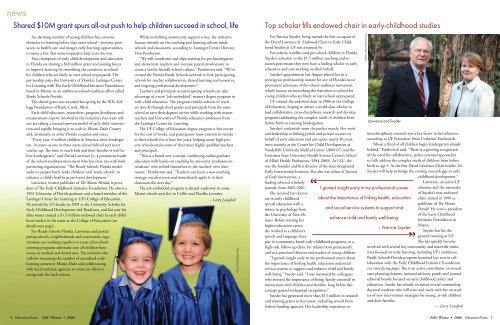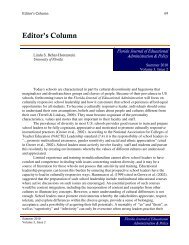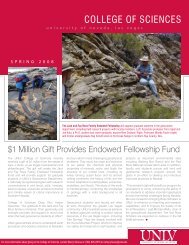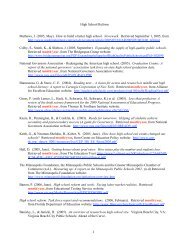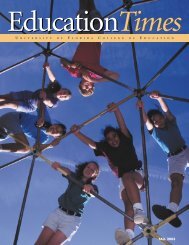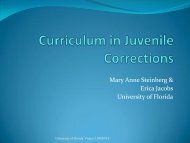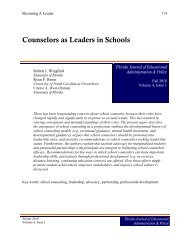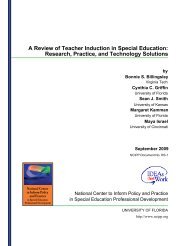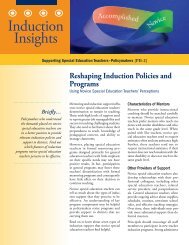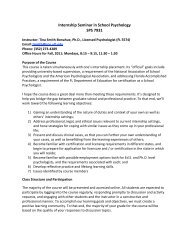Revival - College of Education - University of Florida
Revival - College of Education - University of Florida
Revival - College of Education - University of Florida
- No tags were found...
Create successful ePaper yourself
Turn your PDF publications into a flip-book with our unique Google optimized e-Paper software.
newsShared $10M grant spurs all-out push to help children succeed in school, lifeTop scholar fills endowed chair in early-childhood studiesAn alarming number <strong>of</strong> young children face extremeobstacles to learning before they enter school—poverty, pooraccess to health care and meager early-learning opportunities,to name a few. But some impressive help is on the way.Two champions <strong>of</strong> early child development and educationin <strong>Florida</strong> are sharing a $10 million grant and joining forcesto improve learning by smoothing the transition to schoolfor children who are likely to start school unprepared. Thepartnership pairs the <strong>University</strong> <strong>of</strong> <strong>Florida</strong>’s Lastinger Centerfor Learning with The Early Childhood Initiative Foundation,based in Miami, in an ambitious school-readiness effort calledReady Schools <strong>Florida</strong>.The shared grant was awarded last spring by the W.K. KelloggFoundation <strong>of</strong> Battle Creek, Mich.Early child educators, researchers, program developers andmeasurement experts involved in the initiative’s four-year rolloutare taking a research-proven model <strong>of</strong> early child interventionand rapidly bringing it to scale in Miami-Dade Countyand, ultimately, to other <strong>Florida</strong> counties and states.“Every year, 4-million children in America enter kindergarten.As many as one in three starts school behind and nevercatches up. The time to reach kids and their families is well beforekindergarten,” said David Lawrence Jr., a prominent leader<strong>of</strong> the school-readiness movement who has close ties with bothpartnering organizations. “The Ready Schools <strong>Florida</strong> modelseeks to prepare both ‘ready children’ and ‘ready schools’ toenhance a child’s healthy growth and development.”Lawrence, former publisher <strong>of</strong> The Miami Herald, is president<strong>of</strong> The Early Childhood Initiative Foundation. He also is a1963 <strong>University</strong> <strong>of</strong> <strong>Florida</strong> graduate and a board member <strong>of</strong> theLastinger Center for Learning at UF’s <strong>College</strong> <strong>of</strong> <strong>Education</strong>.He joined the UF faculty in 2001 as the <strong>University</strong> Scholar forEarly Childhood Development and Readiness, and last year hisalma mater created a $1.5 million endowed chair in early childhoodstudies in his name at the <strong>College</strong> <strong>of</strong> <strong>Education</strong> (seedetails next page).For Ready Schools <strong>Florida</strong>, Lawrence said participatingschools, neighborhoods and community organizationsare working together to create after-schooltutoring programs and make sure all children haveaccess to medical and dental care. The initiative alsocalls for increasing the number <strong>of</strong> accredited earlylearningcenters in Miami-Dade and collaboratingwith local and state agencies to create an effectiverating scale for such centers.While mobilizing community support is key, the initiativefocuses intently on the teaching and learning culture insideschools and classrooms, according to Lastinger Center DirectorDon Pemberton.“We will coordinate and align training for pre-kindergartenand elementary teachers and increase parent involvement tocreate a family-friendly school culture,” Pemberton said. “We’vecreated the <strong>Florida</strong> Ready Schools network to link participatingschools for teacher collaboration, shared learning and resources,and ongoing pr<strong>of</strong>essional development.”Teachers and principals at participating schools can takeadvantage <strong>of</strong> a new “job-embedded” master’s degree program inearly child education. The program enables cohorts <strong>of</strong> teachers(pre-K through third grade) and principals from the sameschool to earn their degrees on-site while working with masterteachers and <strong>University</strong> <strong>of</strong> <strong>Florida</strong> education pr<strong>of</strong>essors fromthe Lastinger Center for Learning.The UF <strong>College</strong> <strong>of</strong> <strong>Education</strong> degree program is free exceptfor the cost <strong>of</strong> books, and participants must commit to remainat their schools for at least five years, helping many high-povertyschools retain some <strong>of</strong> their most highly qualified teachersand principals.“This is a brand new concept, combining online graduateeducation with hands-on coaching by university ‘pr<strong>of</strong>essors-inresidence’who embed themselves in the teachers’ own classrooms,”Pemberton said. “Teachers can learn a new teachingstrategy one afternoon and immediately apply it in theirclassroom the next day.”The job-embedded program is already underway in someMiami schools and also in Collier and Pinellas counties.– Larry LansfordTIM LOCKETTE/Ed TimesFor Patricia Snyder, being named the first occupant <strong>of</strong>the David Lawrence Jr. Endowed Chair in Early ChildhoodStudies at UF was a natural fit.For infants, toddlers and pre-school children in <strong>Florida</strong>,Snyder’s selection to the $1.5 million teaching and researchpost means they now have a leading scholar in earlyeducation and care working on their behalf.Snyder’s appointment last August placed her in aprestigious pr<strong>of</strong>essorship named for one <strong>of</strong> <strong>Florida</strong>’s mostprominent advocates <strong>of</strong> the school-readiness movement,which focuses on smoothing the transition to school foryoung children who are likely to start school unprepared.UF created the endowed chair in 2006 in the <strong>College</strong><strong>of</strong> <strong>Education</strong>, hoping to attract a world-class scholar tolead collaborative, cross-disciplinary research and developprograms addressing the complex needs <strong>of</strong> children frombefore birth to entering kindergarten.Snyder’s credentials seem the perfect match. Her workand leadership in linking public and private sectors onbehalf <strong>of</strong> early education and care spans nearly 30 years,most recently at the Center for Child Development atVanderbilt <strong>University</strong> Medical Center (2005-07) and theLouisiana State <strong>University</strong> Health Science Center’s School<strong>of</strong> Allied Health Pr<strong>of</strong>essions (1984-2005). At LSU, shewas the founder and first director <strong>of</strong> the state-designatedEarly Intervention Institute. She also was editor <strong>of</strong> Journal<strong>of</strong> Early Intervention, a“leading refereed scholarlyjournal, from 2002-2007.She received her doctoratein early childhoodspecial education with aminor in psychology fromthe <strong>University</strong> <strong>of</strong> New Orleans.Before starting herhigher-education career,she worked as a children’sspeech and language therapistin community-based early childhood programs, at ahigh-risk, follow-up clinic for infants born prematurely,and as a preschool director and teacher <strong>of</strong> young children.“I gained insight early in my pr<strong>of</strong>essional career aboutthe importance <strong>of</strong> linking health, education and socialservice systems to support and enhance child and familywell-being,” Snyder said. “I was mentored by colleagueswho stressed the importance <strong>of</strong> being ‘family-centered’ ininteractions with children and families, long before thisconcept gained widespread recognition.”Snyder has generated more than $13 million in researchand training grants in her career, including several fromfederal funding agencies. Her leadership experience inLARRY LANSFORD/Ed TimesLawrence and SnyderI gained insight early in my pr<strong>of</strong>essional careerabout the importance <strong>of</strong> linking health, educationand social service systems to support andenhance child and family well-being.interdisciplinary research was a key factor in her selection,according to UF <strong>Education</strong> Dean Catherine Emihovich.“About a third <strong>of</strong> all children begin kindergarten alreadybehind,” Emihovich said. “There is a growing recognition<strong>of</strong> the need for collaborative, policy-oriented approachesto fully address the complex needs <strong>of</strong> children from beforebirth to age 5. As the first David Lawrence Chair holder, Dr.Snyder will help to bridge the existing research gap in earlychildhood development.”Lawrence, an active UFalumnus and the namesake<strong>of</strong> Snyder’s new endowedchair, retired in 1999 aspublisher <strong>of</strong> The MiamiHerald. He now is president<strong>of</strong> the Early ChildhoodInitiative Foundation inMiami.— Patricia SnyderSnyder has hit the”ground running at UF.She has quickly becomeinvolved with several key community and statewide initiativesfocused on early learning, including UF’s ambitiousReady Schools <strong>Florida</strong> program launched last year in collaborationwith the Early Childhood Initiative Foundation(see story facing page). She is an active contributor on severalstate planning forums, national advisory panels and journaleditorial boards focused on early childhood policy andeducation. Snyder has already recruited several outstandingdoctoral students who will train and work with her on studies<strong>of</strong> new intervention strategies for young, at-risk childrenand their families.— Larry Lansford <strong>Education</strong>Times Fall / Winter • 2008Fall / Winter • 2008 <strong>Education</strong>Times


